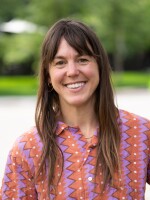Colorado voters approved a ballot measure in 2024 enshrining the right to an abortion in the state constitution and allowing public funding for the procedure.
However, those protections do not guarantee all Coloradans have equal access to abortion. Outside of the Front Range, in rural parts of the state, the time and resources necessary to reach clinics are often prohibitive.
After her mentor and boss, the Kansas abortion provider Dr. George Tiller, was murdered in 2009, Julie Burkhart began establishing abortion clinics in underserved areas.
Aspen Public Radio’s Sarah Tory spoke with Burkhart last month about the lingering barriers to abortion access in Colorado and the consequences of restricting that care.
The conversation below has been edited for clarity and length.
Sarah Tory: Why focus on opening clinics in states like Wyoming, where abortion rights have been heavily restricted?
Julie Burkhart: I have a very deep commitment to that, because I come from an agricultural family in northern Oklahoma. I was raised in the country. I know what it's like to be out in the hinterlands, and just because you live in a certain geographic area doesn't mean that you don't need or deserve access to quality health care.
Wyoming has laws on the books that grant people that right and a wonderful, frankly, state constitution. It just really didn't seem right to us that we don't open a clinic there because people have these rights, but they're not able to exercise those rights because there was just no health care provider.
Sarah Tory: In the Mountain West region, Colorado — as we've talked about — is sort of an island in many ways in terms of access to abortion and protection of abortion rights. Is that true in all parts of the state, or are there places where abortion care is still difficult to access?
Julie Burkhart: So here in Colorado, if you need or want a procedural abortion, you have to travel to one of the clinics that's on the Front Range. It puts a lot of pressure on people who aren't living in that metropolitan area of the Front Range. From Fort Collins down to Pueblo, you can access procedural abortion very easily, but when you get over the mountains, it turns into a different story.
Financially, if you have to travel for hours and hours to a clinic on the Front Range, then, if you have children, who's going to take care of them? You might have to take more time off work, and so one thing that we're very interested in and invested in: how can we help to provide more of that service to people in this part of the state?
Sarah Tory: What are the consequences of restricting access to abortion care?
Julie Burkhart: Well, you could take any number of cases from Georgia, Texas, Idaho. In those states, women have been turned away from their doctors’ offices, from emergency departments — the physicians having been advised that the law is a little too murky, and they don't know how to proceed.
(Those states are) literally turning women away and forcing them to go out of state to another facility instead of getting that critical life-saving treatment right there at that hospital or at that doctor's office. And that is not only putting women in danger, but it's denying women the right to life. People who might have just needed a simple procedure or a simple treatment ended up being damaged or losing their lives.



